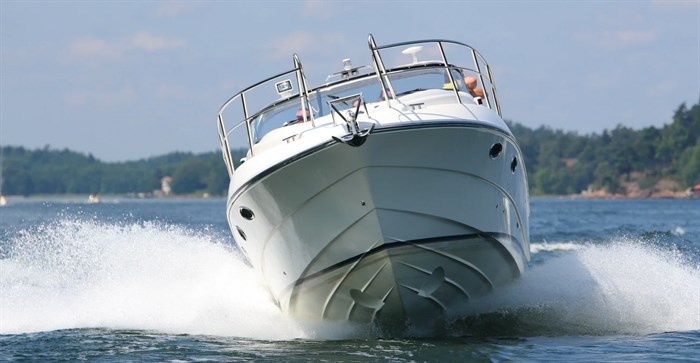
Image Credit: Unsplash/RobertGunnarsson
June 10, 2021 - 7:30 AM
As summer ramps up in the Okanagan and Shuswap more and more people are flocking to major lakes to enjoy time on, in or beside the water.
But there are a few who want to bypass legal constraints on boat motors so everyone else can hear them roaring up and down the lakes.
“It’s probably two people, likely guys, and you and 500 or 1,000 other people say: ‘Why do we have to listen to this?’” Chris Lapointe, the founder of the Kelowna chapter of the Decibel Coalition, told iNFOnews.ca “Why can a few ruin it for so many? I find it really does diminish the whole thing for many of us getting outdoors for some peace and quiet and enjoying nature and enjoying your thoughts.”
The Decibel Coalition is a national volunteer effort trying to convince Transport Canada to change the laws on noise coming from power boats.
Right now, the rules are based on the equipment installed in boats by manufacturers or modified by those who enjoy noise more than the quiet lapping of waves.
“Most police officers aren’t mechanics – most people, in fact, aren’t mechanics,” Lapointe said. “To actually enforce the law, you have to know a lot about engines and how they function.”
Over the years, in response to noise complaints, manufacturers have done a great job of building quieter boats while maintaining the engine power needed for things like water skiing or wakeboarding, he said.
But, manufacturers can legally put bypass switches on those motors that let them roar loudly. It’s just not legal for operators to flip those switches on, but almost impossible to prove if they do.
Or do-it-yourselfers put in their own bypass switches.
Many U.S. states and European countries have switched their regulations to be based on decibel levels which are much easier to enforce.
The Decibel Coalition is aiming to make the same change in Canada but it won’t be an easy or quick task. At this point, it’s not listing a specific decibel limit.
Larger lakes are under the control of Transport Canada so any change has to be done on a national level.
Safe Quiet Lake is an Ontario-based group that is gaining some traction nationally and Decibel Canada is working in conjunction with them to put pressure on Transport Canada to make the change.
Lapointe is a director of the Okanagan Mission Residents Association and heard about the project during a presentation to that group, which is supporting the initiative.
The plan is to work to get 30 to 40 local organizations such as residents associations, outdoor recreation groups and strata councils, to sign onto the initiative.
Once he can show that level of support, he can start lobbying local government. Those bodies can be reluctant to be the first to champion such initiatives so it helps to show there is community support first, Lapointe said.
While local governments can’t control what goes on below a lake’s high water mark, they can show that there is a groundswell of opposition to this kind of noise.
Of course, proving there is a groundswell may also be a challenge.
“I’m a boater myself and have been all my life and I find there’s definitely a growing problem,” Lapointe said. “Right now it may not be a big issue. But some of the feedback we’re getting is from people jumping on board and saying 'this is great.' But there’s also a lot of comment saying 'hey is it really a problem?’
“My reaction to that is, it’s one of those things that has ebbed and flowed over the years so it’s a question of when is it going to become a problem. With the growth going on in the region and the growth in numbers and growth in wealth and growth in number of boats on the lake, it’s just a matter of time. Some people today believe it’s a significant problem, anybody who lives down or near the water.”
Given that it’s expected to take two or three years to build a national movement and get Transport Canada on board, this is a good time to start.
As far as he knows, there’s only one other such effort in B.C. with the recently formed Shuswap and Mara Lakes Decibel Coalition.
Its members are planning to head out this summer armed with decibel meters to collect data on boat noise in their region to add to the campaign.
Lapointe is looking for support from organizations and welcomes any help he can get from others throughout the region. He can be contacted by email at chris.lapointe@northsands.ca
And really, Lapointe said, there are only a handful of people who are going to be impacted by new noise regulations, if they are put in place.
“There’s so few people making it,” he said. “To have two or three guys making a hell of a racket for their self-enjoyment, that’s pretty selfish.”
Go here to learn more about the Decibel Coalition.
To contact a reporter for this story, email Rob Munro or call 250-808-0143 or email the editor. You can also submit photos, videos or news tips to the newsroom and be entered to win a monthly prize draw.
We welcome your comments and opinions on our stories but play nice. We won't censor or delete comments unless they contain off-topic statements or links, unnecessary vulgarity, false facts, spam or obviously fake profiles. If you have any concerns about what you see in comments, email the editor in the link above.
News from © iNFOnews, 2021